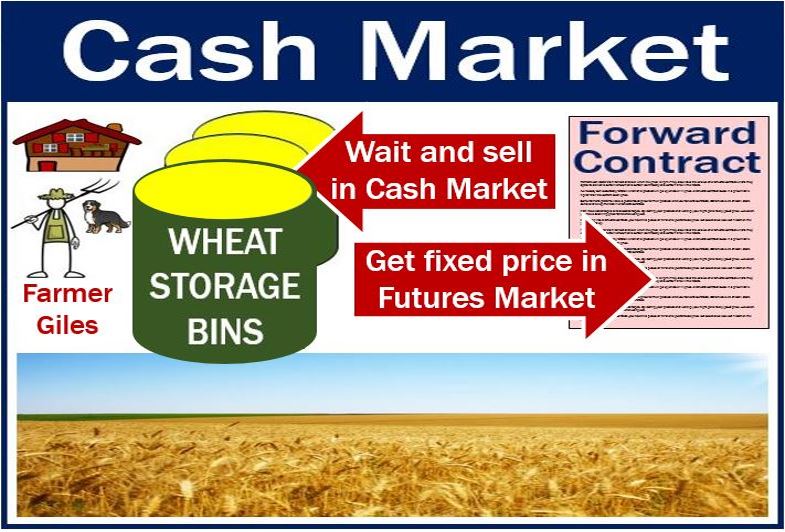A cash market, spot market, or physical market is a public financial market. In this market, traders buy and sell commodities or financial instruments for immediate delivery.
Cash markets contrast with futures markets, where delivery is for a later date.
Settlement occurs within up to two working days in a cash market. In other words, you must pay cash and receive your purchase within two days of the trade date.
In the spot foreign exchange market, for example, there is a two-day delivery requirement. The two-day requirement came from the time it would take to move the money between banks.
People do most of their speculative retail Forex trading as spot transactions on an online trading platform.
Traders carry out cash market trades on an exchange or an organized market. They may also buy and sell OTC. OTC stands for Over The Counter. In the OTC market, two parties base their transaction on their contract. The two parties do not have to comply with the rules of an exchange.

The price of a commodity in the cash market is typically less than its futures market price. The carrying costs make it more expensive in a futures market. Insurance and storage are examples of carrying costs.
Cash market vs. futures market
Investors need to know the difference between cash and futures markets. They must also know the difference between spot and futures prices.
The time spread, i.e., the difference, indicates the market’s expectations about futures prices.
Supply and demand are the main drivers of cash markets. Expectations of later prices, however, are the drivers of futures markets. Weather forecasts (for perishable commodities), storage, and insurance costs also influence futures markets.
A commodity is a good that we produce in bulk and can be bought and sold. For example, coffee, meat, grain, metals, and oil are commodities.
Cash market and forward contracts in farming
Farmers can store their harvest and sell when the price is right. They also have the choice of a forward contract. In a forward contract, they agree to deliver a certain amount of a specific commodity at a given time. This given time is in the future.
Nobody can accurately foretell whether a product will go up or down in price. Therefore, a forward contract locks in a price that is higher than the current cash price.
Some farmers prefer to have a set price for their product. So, they use forward contracts. Others do a bit of both. In other words, they store some of their goods and tie up the rest in a forward contract.
Both options have advantages and disadvantages. By storing your product and waiting, you might get a really good price. However, you risk facing a declining price trend and losing out.
By locking into a forward contract, you have peace of mind. You know what the price is. However, you could also lose out if later on the price shoots up.
